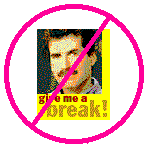
Light Rail Now and Walkable Neighborhoods (LRN) can be contacted at: Light Rail Now! |
Congressman Kucinich Disagrees Rep. Kucinich's Letter to 20/20 Ohio Representative Dennis Kucinich--10th District Ohio--had written his own response to John Stossel's earlier version of the 20/20 piece -- titled "Railroad to Nowhere" -- which aired in 1998. Kucinich's letter is included below. December 14, 1998 COMPLAINT BOARD: 20/20: "Railroad To Nowhere" Dear Mr. Arledge: I am writing regarding a story that aired on the ABC News program 20/20 on December 11, 1998 titled "Railroad to Nowhere." in this report, the reporter, John Stossel, refers to the mismanagement and construction problems associated with building the Metro Red Line system in Los Angeles as justification for an attack on mass transit, specifically subways, across the country. As a former broadcast journalist, I understand how painstaking it is to put together a comprehensive story to run in a limited amount of time. However, I believe that broadcast journalism should be held to the same standard as print journalism and that each side of a story should be adequately presented. The reporter mentioned that the Los Angeles subway doesn't go where most people want to go. However, the system is still under construction and many believe that its popularity will grow when it is finished. Furthermore, the Metro was never meant to relieve all the city's traffic congestion. Rather, it is meant to be used in conjunction with the successful light rail and bus systems already in place. irrespective of the situation in Los Angeles, it is ludicrous to present a small part of one case, leap to the conclusion that similar rail systems in other cities have allegedly failed for the same reasons, and advocate scrapping the entire idea of commuter rail and subway systems altogether. There are only so many buses and cars that can be jammed onto already over-congested highway systems across the country. Contrary to Mr. Stossel's claims, rail is a viable, fast, and environmentally-friendly alternative. Mr. Stossel waves off the idea of implementing rail systems as a way of reducing pollution and traffic congestion as a failed city planners' theory. How, then, would he propose to alleviate these problems? They are certainly not going to disappear as more and more people take to the roads. According to the Federal Highway Administration, the number of highway vehicles registered in the United States alone since the 1970's has increased faster than the country's overall population. Mr. Stossel mentioned the excessive financial cost of constructing more and more rail systems, but what is the environmental cost of increased amounts of greenhouse gases, such as carbon dioxide, becoming trapped in the earth's atmosphere as a result of more cars on the roads? The environmental cost is global warming. As a member of the House Government Reform and Oversight Committee, I have participated in numerous hearings regarding global warming. If we do nothing, temperatures will become warmer. We may experience prolonged droughts, torrential rains, and more severe storms. Erosion may endanger habitats for fish and birds and species may disappear. There could be massive crop failures resulting in higher food bills. Torrential rains may overwhelm our sanitary systems contaminating our drinking water. Water could become scarce and expensive during a drought. More hurricanes could cause much property loss and loss of life, since half of the world's population lives in coastal areas. And, there may be increases in heat-stress mortality, tropical diseases, and urban air pollution problems. These are only a few scenarios. The EPA reports that transportation activities accounted for 26% of the total U.S. greenhouse gas emissions between 1990 and 1996, and carbon dioxide, produced mainly from fossil fuel combustion, is the main contributor of greenhouse gas emissions. Aside from contributing to global warming, motor vehicles are also the major cause of other serious air pollution problems, including ground level ozone (smog), acid rain and fine particulate matter. I don't consider myself a train buff, as Mr. Stossel assumes all Washington politicians are, but I do consider myself a clean air buff. So, wherever mass transit systems are reducing the amount of carbon dioxide being emitted into the atmosphere and providing commuters alternative ways to travel, it is worthy of commendation. I believe your viewers deserve to hear a different point of view on this issue, and I urge you to broadcast a more balanced response to Mr. Stossel's report. Thank you for your consideration. Sincerely, Dennis J. Kucinich Member of Congress DJK:jj
|
|
|
|